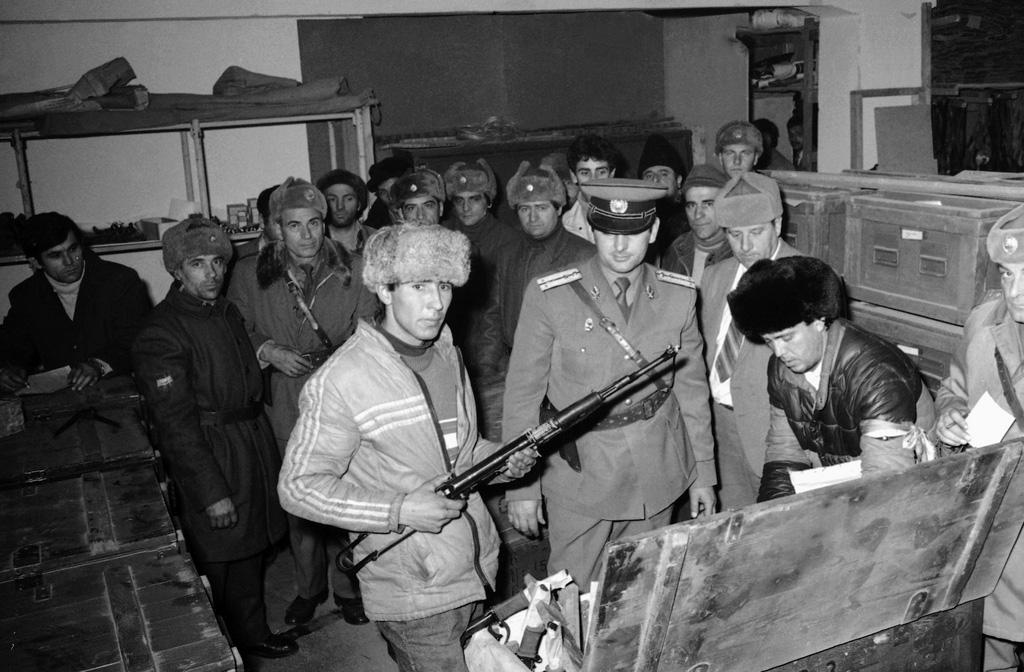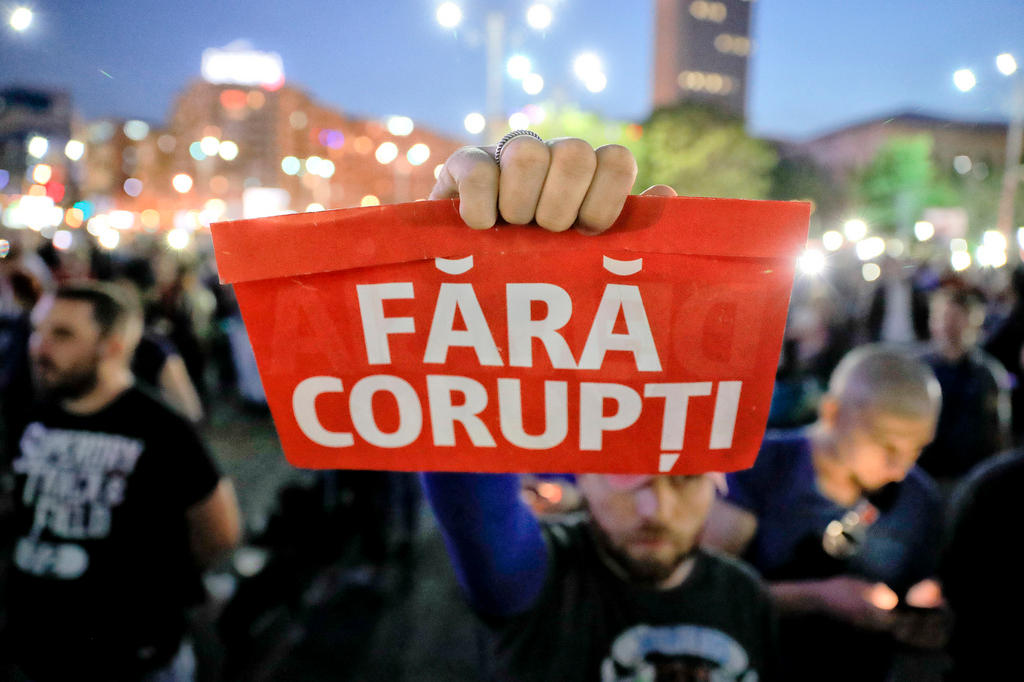Romania’s street protests: the real story

At the beginning of this year, Romania saw the largest protests since the fall of the Communist regime in 1989. Supported by President Klaus Iohannis, many citizens were very excited that so many people marched peacefully for one goal: supporting the “anti-corruption fight.” But there is also another reality behind the demonstrations.
The “anti-corruption fight“ is officially carried out by the Anti-Corruption National Department (DNA), an institution led by Laura Codruța Kovesi. Over the past two years, hundreds of state officials, including many parliamentarians, have been prosecuted and sent to jail. It is only natural that, after being robbed for 25 years by politicians, Romanians are now thirsty for blood. They want to see politicians in handcuffs sent to provisional detention, preferably covered live by every news network in the country.
At the same time, judges also sentenced the country’s richest businessmen to prison, decisions that led to many Romanian private companies going bankrupt.

More
The Romanian corruption challenge to democracy
The interesting thing is, however, that even though Romania’s resources have been almost entirely privatised and are now in the hands of foreign (generally European) investors, not one single foreign citizen has been prosecuted.
Even after Austrian manager Karl Schmid of Holzindustrie Schweighofer, the biggest wood processor in Romania, was secretly filmed by the environmental investigation agency, as he negotiated and openly accepted illegal wood, no investigation whatsoever was started by the anti-corruption agency.
the author of this text is an economist living in Bucharest and has worked with NGOs and human rights groups. He wrote this story for our media partner people2power.info.
Why is it that the DNA agency brings Romanian businessmen and politicians to court, including the heads of both parliament chambers, but does not investigate one single foreigner? Recent disclosures show us why.
Largest secret service
In communist times, Romania had a powerful and abusive secret service called Securitate. After 1989, the secret service changed its name to the Romanian Service for Information (SRI). It is nowadays the largest secret service in Europe, with about 12,000 members (estimated by the Italian newspaper La Reppublica) and a budget greater than the secret service of Germany.
One of the members of SRI, Sebastian Ghiță, who has been prosecuted by DNA, has fled the country before Christmas 2016 (he was recently found in Serbia).
But following in the footsteps of whistleblower Edward Snowden, he continued sending important information to his TV network, Romania TV. (It might be unusual for some people to learn that a secret service agent openly owns a TV network, yet the SRI is entitled to own companies directly or through intermediaries. This is also the case of Hexi Pharma, a pharmaceutical firm recently involved in a public scandal for diluted disinfectants.)
In several tapes, Ghiță disclosed that he took part in meetings in SRI villas, together with DNA chief Kovesi, SRI military chief Coldea as well as Eric Easley, head of the CIA station in Romania.
Ghiță implied that Kovesi and Coldea are working for the CIA. And, to show that he is a credible source, Ghiță produced hotel bills of his vacations together with General Coldea.
He also stated that former Prime Minister Victor Ponta was blackmailed by General Coldea to give up plans for building a section of a motorway, putting the money into weapons instead. After these disclosures, General Coldea retired.
This text is part of #DearDemocracy, a platform on direct democracy issues, by swissinfo.ch.
Another recent event was a 10% cut in the budget of SRI. At approximately the same time, President Iohannis triggered the demonstrations by claiming the Socialist-liberal (PSD-ALDE) government wants to pardon corrupt politicians through an emergency decree.
Mass pardon and €44,000 limit
Hardly anybody in Romania subscribes to print publications, making online outlets – besides TV networks – the main media which rely on funds from undisclosed sources.
People are not used to questioning who is behind these sources. This makes it easy for the SRI to propagate its opinions using dozens of online publications popular among young people.
While a mass pardon for at least 2,000 prison inmates has indeed been considered by the governing coalition, this was due to the fact that Romania’s jails are overcrowded, filthy, infested with rats, and the convicts do not get any medical treatment. According to official sources every three days one inmate dies.
Romania is due to pay huge fines because of its jail system. But the proposed pardon excludes corruption cases. Yet contrary to actual facts, both President Iohannis and the news websites continued to claim that the amnesty would be granted.
The second issue was a government decree, issued overnight, modifying the penal code with respect to the offence of abuse of office. It is an offence that is not prosecuted under penal law in most European countries.
The government introduced a limit of about €44,000 (CHF47,730), following a ruling from the constitutional court, which ordered an amendment. Offenders found guilty of abuse of office below that limit, would not be sent to jail but have to pay a fine.
Under Romanian law, abuse of office was applied both in the public and private sectors. It does not mean stealing, but being detrimental to an institution or to private individuals by breaking any law whatsoever while in office.
Protest
This government’s decision triggered the largest protests at the beginning of February 2017 with online media condemning it as “legalising theft under €44,000”!
As a result, there was widespread confusion as many people do not make any distinction between such crimes as theft, bribery, or abuse of office.
The government decree was withdrawn after the demonstration, but the DNA investigated the issuing of the ordinance anyway.
The constitutional court later stated that the investigation from DNA it is an intrusion of the judiciary in the matter of the government, and it is against the principle of the state of law.
The new justice minister also made a public report on the chief of the anti-corruption agency and to the prosecutor general, Augustin Lazăr, severely criticising the investigation. But nobody called for a resignation.
So what makes so many people support an institution that is itself corrupt?
DNA has often put under investigation judges who did not support its indictments, and sometimes even its own prosecutors.
The prosecutor of media tycoon Voiculescu, is accused of accepting bribes; the prosecutor of PSD leader Liviu Dragnea, is accused of trading his influence; and the prosecutor of ex-prime minister Ponta and SRI member Ghiță, has just resigned after a conversation with the wife of an offender was aired on television.
In this conversation he disclosed important information about her husband’s prosecution. However, almost no one cares if the prosecutors themselves are corrupt, as long as they condemn as many politicians as possible.
Lack of experience with democracy
I don’t claim, of course, that Romanian politicians are saints. Many of them are in fact corrupt. However they don’t get convicted for their real crimes, but for small and rather unimportant offences, or for crimes that are not really offences at all, like mobilising voters for a referendum by sending text messages, while ex-president Băsescu was indicted – an offence for which PSD leader Dragnea received a suspended sentence of two years.
If such rigour were applied in Europe, most politicians would also end up in jail. Romania does not have a law for the liability of prosecutors or judges, so even though many cases are overturned at the European Court of Human Rights, the citizens pay the fines and no one in the justice system is punished.
As to the demonstrations in the streets of Romania, none of them had an actual authorisation from the local mayor.
Most people who came to the streets were convinced that the best information source is the Internet, and that prosecutors are better than politicians.
The lack of experience in a democratic regime prevented them from realising that any one of them can be prosecuted at any moment, and sent to jail, under the old form of the offence of abuse of office.
The online media has convinced people that they are demonstrating against politicians, when in fact, they are demonstrating against their own interest. This is the sad reality behind the beautiful “anti-corruption” demonstrations of Romania.
The views expressed in this article are solely those of the author, and do not necessarily reflect the views of swissinfo.ch.

In compliance with the JTI standards
More: SWI swissinfo.ch certified by the Journalism Trust Initiative









You can find an overview of ongoing debates with our journalists here . Please join us!
If you want to start a conversation about a topic raised in this article or want to report factual errors, email us at english@swissinfo.ch.